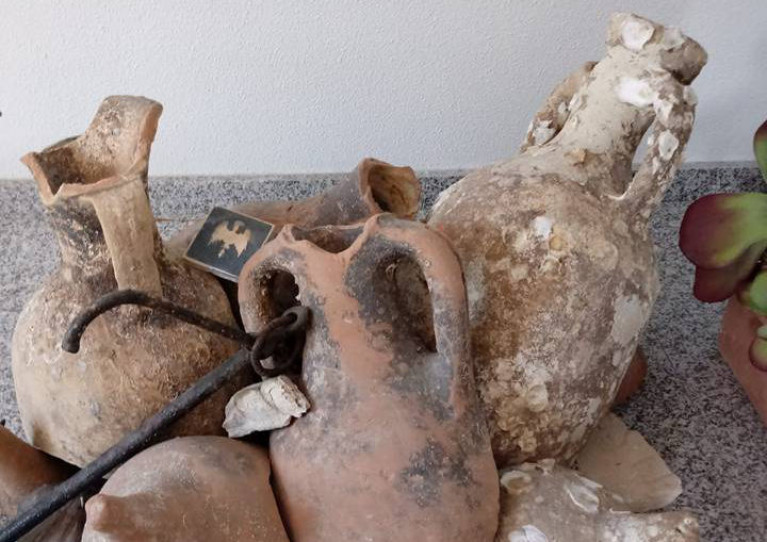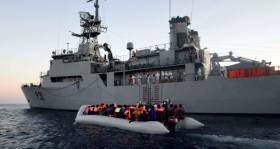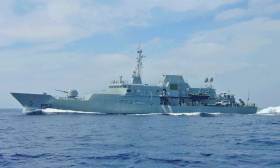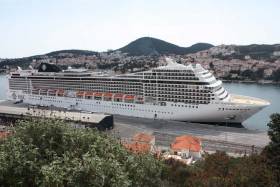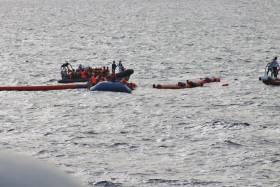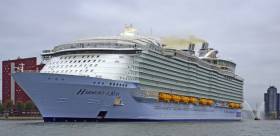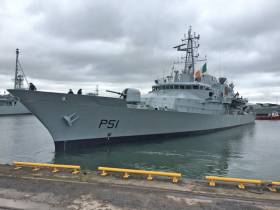Displaying items by tag: Mediterranean
A team of marine experts believe they have cracked the mystery of why a pod of orcas have been ramming boats in the Mediterranean in recent years.
Following one of the most recent incidents, in which a 15-metre yacht was sunk after interaction with the marine wildlife apex predators, a study on their behaviour says it’s all down to “child’s play”, as New Atlas reports.
More specifically, the International Whaling Commission report on the so-called “Gladis” pod of Iberian orcas claims that an abundance of bluefun tuna in the region’s waters means the younger cetaceans are spending less time feeding and more time playing.
And just as other orca groups around the world have been observed adopting various ‘fads’ — such as the pod off the USA’s Pacific North West coast that wore salmon ‘hats’ in the late 1980s — it appears this group have taken to bumping boats as their trend of choice in their ample free time.
The report is also at pains to emphasise that despite the havoc experienced by Mediterranean boaters, the animals really mean no harm.
“The use of such terms as ‘attack’ to describe these interactions is thus inappropriate, misleading and should cease,” it adds.
New Atlas has more on the story HERE.
A sailing yacht has been sunk in the Strait of Gibraltar in the latest of a spate of incidents involving orcas in the region.
According to RTÉ News, the 15-metre yacht Alboran Cognac was rammed by the cetaceans on Sunday morning (12 May) and began to take on water.
The yacht’s two occupants were rescued by a nearby oil tanker in waters off Morocco and the yacht was left adrift before it eventually sank.
It marks the latest in a lengthy series of interactions between the so-called “Gladis” pod of Iberian orcas and sailing vessels dating back to early 2020.
The marine wildlife apex predators have been linked to hundreds of incidents off Spain, Gibraltar, Portugal, Morocco and France — seven of them resulting in shipwrecks, as Marine Industry News reports.
Some marine science experts believe that the orcas may be getting an “adrenaline shot” and ramming vessels in a playful manner rather mounting coordinated attacks as some fear, as previously reported on Afloat.ie.
Ancient Roman Artefacts Found In Spanish Seafood Shop
A routine inspection of a frozen seafood shop near Alicante in Spain has revealed a trove of ancient Roman artefacts, as the Guardian reports.
Objects including a number of ceramic amphoras — receptacles for carrying oil and other liquids — had been taken from the water by the owner’s son on fishing trips in the Mediterranean and used to decorate the shop in Santa Pola, it has emerged.
The items were confiscated by the authorities and examined by experts at the local Museum of the Sea, who say they likely come from shipwrecks off the eastern Spanish coast and could date back nearly 2,000 years.
The Guardian has more on the story HERE.
Fine Gael MEP Defends Vote Against Measure To Enhance Mediterranean Rescue Missions
Fine Gael MEP Maria Walsh has defended her decision to vote against a resolution in the European Parliament to enhance rescue missions for migrants in the Mediterranean.
The vote in Strasbourg yesterday (Thursday 24 October) lost by two. Every Fine Gael MEP — Walsh, Frances Fitzgerald, Sean Kelly and Mairéad McGuinness — voted against the resolution.
There were also four votes not recorded, from independent Clare Daly, Billy Kelleher (Fianna Fáil), Dianne Dodds (DUP) and Naomi Long (Alliance).
The Fine Gael MEPs have been criticised for their stance against the resolution that called on member states to “step up their efforts” and “enhance proactive search and rescue operations” in the Mediterranean, a signifiant and perilous crossing point for people from Africa and Asia seeking asylum in Europe.
The vote result was applauded in the chamber among the far-right block of European parliamentarians, a response condemned among others by Green Party MEP Grace O’Sullivan who voted for the resolution.
Speaking on behalf of her fellow party MEPs, Walsh said their decision was based on issues with ‘sharing intelligence’.
“We want to save lives and fight human traffickers and to do that, we need a coherent, comprehensive and long-term EU response to search and rescue in the Mediterranean,” she said after the vote.
“In the short-term, the EU and member states must allocate more resources to Search and Rescue and increase missions to save more lives. We also need to urgently step up the fight against the organised criminals and human traffickers who profit on the vulnerable.
“The resolution rejected by the European Parliament today does the opposite by calling for Frontex, the European border and coastguard agency, to share intelligence about its operational activities with every boat in the Mediterranean.
“That would endanger more lives by facilitating, instead of dismantling, the business models of smugglers and human traffickers. We could not support that.”
Walsh, who sits on the European Parliament’s Civil Liberties Committee, said “we can do so much better” than the failed resolution “which plays into hands of people smugglers and lacks workable solutions”.
Update Friday 25 October: this article has been corrected to note that the absent votes of four Irish MEPs were not recorded.
Naval Service Vessels Will Not Patrol Mediterranean Sea
A number of Irish Naval Service vessels, RTE reports, will not be able to patrol the Mediterranean Sea to assist with the rescue of migrants, the Taoiseach has told the Dáil.
Leo Varadkar said that as three Irish naval vessels are in operational reserve or undergoing maintenance, the navy's operations will be restricted.
Confirming that the Irish Navy will not be in a position to return to the Mediterranean he said: "We will have to focus on our seas and on fishery protection and drug interdiction instead."
Responding to questions from Sinn Féin leader Mary Lou McDonald, Mr Varadkar said: "Those vessels will be out of service until mid-September and late October. But with current staffing levels it is unlikely they will be brought back into service. So that means three ships will be held in operational reserve or in maintenance with the remaining six vessels fully operational.
"It does mean that some operations will be restricted, for example the naval service will not be able to return to the Mediterranean because we will have to focus on our seas and on fishery protection and drug interdiction instead."
For more including the Taoiseach and response from political opposition click here.
LÉ Niamh Departs On New Med Mission To Intercept Migrant Boats
#Navy - The LÉ Niamh is headed for the Mediterranean today (Friday 6 October) for the Naval Service’s first ever role in an operation directly targeting human traffickers.
As BreakingNews.ie reports, the EU mission Operation Sophia aims to intercept boats used by people-smugglers from the Libyan coast and return migrants to North Africa.
However, the pivot away from rescue missions has been criticised by Sinn Féin’s defence spokesperson Aengus O'Snodaigh, who cites “appalling” conditions for returned migrants in Libyan detention centres.
Dubliner To Be Charged With Murder Of Wife Missing From Cruise Ship
#Missing - A Dublin-based man was set to be charged with the murder of his wife, who went missing from a Mediterranean cruise earlier this month.
Daniel Belling, a German citizen and IT professional, was detained this week before boarding a flight from Rome to Dublin, as The Irish Times reports.
The arrest came after the crew of the cruise liner MSC Magnifica discovered that Belling’s wife Li Yinglei did not disembark the vessel with him and their two children at Civitavecchia after a 10-day cruise.
Belling was reportedly being held at Rome’s Regina Coeli prison ahead of formal charges today (Friday 24 February).
In other news, a post-mortem was set to take place today on the body of a man taken from a canal on the River Shannon at Killaloe yesterday.
BreakingNews.ie reports that the man in his 60s was recovered by the local Irish Coast Guard unit after he was seen by a passer-by in the water at Killaloe Bridge.
Naval Service Vessel Rescues More Migrants In Mediterranean
#Navy - The Naval Service’s LÉ Samuel Beckett assisted in rescuing 140 migrants from the Mediterranean off Libya this morning (Saturday 3 December), as The Irish Times reports.
Food, water and medical treatment were provided to the people who were transferred from their rubber boat to the rescue vessel MS Aquarius as part of the latest humanitarian operation in the region.
The operation comes just five days after the crew rescued more than 500 migrants from just four rubber vessels off Tripoli, as previously reported on Afloat.ie.
Crewman Dies In Lifeboat Accident On World's Biggest Cruise Liner
#CruiseLiners - A crewman has died during a safety drill on the world's largest cruise liner in the Mediterranean, as AFP reports.
The Filipino was one of five crew members from the Harmony of the Seas who were on board one of the ship's lifeboats when it suddenly detached from the vessel and fell 10 metres into the water below.
Two others on the lifeboat were hospitalised in critical condition after the incident, which occurred after the 362m ocean liner arrived in the port of Marseille in southern France earlier today (Tuesday 13 September).
It's not yet known how the lifeboat came to detach from the cruise liner, which entered service this past May.
According to Mail Online, the ship was described as a 'floating construction site' on its inaugural voyage.
Passengers reported holes in floors and walls, and accident hazards such as cables, blowtorches and power tools left by contractors on the top deck.
L.É. Róisín Leaves For Latest Mediterranean Mission
#Roisin2Med - LÉ Róisín has departed Naval Base at Haulbowline this afternoon (Sunday 1 May) for Ireland's latest search and rescue mission in the Mediterranean.
As previously reported on Afloat.ie, LÉ Róisín follows last year's humanitarian missions by LÉ Eithne, LÉ Niahm and LÉ Samuel Beckett in the Mediterranean, where between them they rescued more than 8,500 migrants.
The latest mission, in conjunction with Italian authorities, sees a 57-strong crew set sail today for the Mediterranean as the first deployment for the Naval Service this year under Operation PONTUS.
LE Roisin slipping and proceeding from Haulbowline en route to Med Search and Rescue mission this afternoon pic.twitter.com/am5WuDhish
— Irish Defence Forces (@defenceforces) May 1, 2016


























